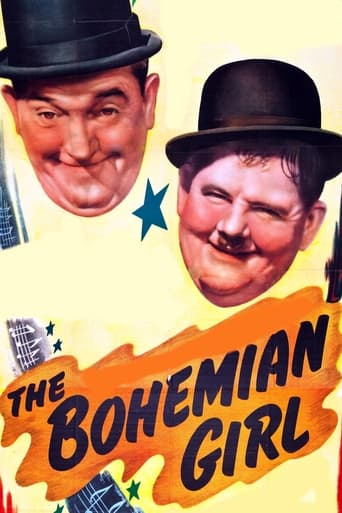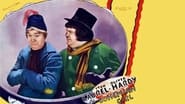JohnHowardReid
Producer: Hal Roach. Copyright 12 February 1936 by Metro Goldwyn Mayer Corp. New York opening at the Rialto: 16 February 1936. U.S. release: 14 February 1936. 8 reels. 70 minutes.SYNOPSIS: Based on the operetta by Balfe, this is a tale of gypsies who, offended by the master of a noble house, kidnap his only child, and raise her as one of their own. Years later, the gypsy band returns to the same locality, where the old nobleman still mourns the loss of his daughter. The girl, now a young lady, in love and unaware of her past, is betrayed by a jealous gypsy woman.NOTES: Final film appearance of Thelma Todd, who died on 16 December 1935. In order to eliminate controversy, most of her scenes were dropped. This film M-G-M's biggest box-office success in France for 1936.COMMENT: One could be nasty and say that it was difficult to tell which was funnier: the scenes that were meant to be funny or those that were meant to be taken seriously. The directors lost a grand opportunity to really send up this ridiculous old operetta by having most of the players including Moreno, Wells, Busch and Carleton play with heavy theatrical over-emphasis admittedly but perfectly straight nonetheless — and even Hardy himself is guilty in his few dramatic scenes. One could say this except that the funny scenes in the hands of such two accomplished masters of timing are so funny, particularly the last couple of reels with Stan doing some delightful business with some empty bottles and a climactic run-in with our old friend James Finlayson and Stan delightfully putting the soldiery to flight with a whip; and we love Oliver's masterful fade-out on the scene in which he is suddenly presented with a six- year-old child — "Come, Stanley, let's spread the glad tidings!" enunciated with delightfully comic emphasis. Where some critics get the idea there are only two songs I don't know. The 52 minute TV version is full of songs, not only solos for some romantic gypsy, Miss Wells and Mr Carleton, but numerous choruses of gypsies and soldiers and an insistent music score that heavily underlies every scene whether "dramatic" or comic. The songs themselves are not bad and some are quite catchy but in keeping with the film's generally drab production values, the sound recording is tinny and the staging is straight out of a stage presentation of the operetta by the Lower Podunk Amateur Dramatic Society. At least the corny and unintentionally ludicrous presentation matches the wheezes of the dialogue (which seems to have been lifted straight from the stage) and the ridiculously melodramatic turns of the plot. Oddly enough the 52 minute TV version in which some unsung genius has made a game try to improve the film by extremely sharp editing and elaborate cross-cutting in the first 30 minutes or so is a reasonable success. Aside from L&H, Finlayson and Zeffie Tilbury alone of the players enact their ludicrous lines with the tongue-in- cheek heartiness they deserve.OTHER VIEWS: The full 70 minutes version is entertaining and also moves fast, though there is still a bit of inventive cross-cutting and the censor has chopped Moreno's flogging scene (which is accompanied bizarrely by a light-hearted tune from the background orchestra). Laurel and Hardy's fortune-telling episode which was deleted from the 52 minutes version has been restored — and a very funny sequence it is too. Oddly it also boasts one of the most effectively inventive camera angles of any L&H movie (not generally noted for their photographic finesse). L&H are remarkably at home in the weird plot, but the support players fare less adroitly. Fin is great but doesn't enter till the climax. On the other hand, Tilbury and Todd (who has virtually nothing outside of her introductory song, which is dubbed anyway) disappear without explanation after their initial scenes. When she finally enters, Julie Bishop makes a fetching heroine, though saddled with obvious dubbing for her famous solo, "I Dreamt I Dwelt In Marble Halls". Despite the poor sound quality and primitive staging, the songs come across excitingly enough to maintain interest in the overly melodramatic plot. A bizarre fade-out with the boys saved NOT just in the nick of time is typical Laurel and Hardy.
Hitchcoc
While we are watching a relatively unknown operetta written by a guy named Balfe, we get to watch some of the funniest stuff Stan and Ollie ever did. I realize they are not on screen as much as we would have liked, but there is a fun plot and they are really interesting characters. They are stereotypical gypsies, stealing stuff from people. They are also victims because Ollie's wife, Mae Busch, takes his money and runs off with some wolfy guy. The boys are left care for a little girl (Darla Hood) who we have seen kidnapped by gypsies (another stereotype) earlier in the film. Anyway, there are so many treats in this, the normal byplay of the two guys, is precious. Stan holds forth with his weird stuff that flabbergasted Oliver. Of course, the scene in the winery where Stan is supposed to fill the bottles will have you on the floor. I still get pains from laughing as I'm watching it. I know that some of the opera is hard for contemporary audiences, but there are a couple of beautiful songs in this one that make it worth listening.
richard-1787
Hollywood could never make this movie today in this way. The Laurel and Hardy scenes, and they are funny, are simply inserted between scene of a very sincere, if corny, production of Balfe's then still popular Bohemian Girl. It never occurs to the director to make fun of this folk opera, which must have taken real restraint, as it is at its best quite corny and could easily have been made fun of. But Roach doesn't. When Eileen sings the big number, "I dreamt that I dwelt in marble halls," the focus is on her and nothing ridicules what was then still a popular number in pops concerts.That's what fascinated me about this picture. Yes, as with the Marx Brothers'A Night at the Opera those with no interest in opera or its performance history will see the operatic scenes as just annoying filler. But for those of us who do have an interest in such things, it's very interesting to see that there was a time when Hollywood could present opera, even not very good opera, in a sincere and straightforward fashion, relying on the audience to enjoy those segments for what they were.Yes, this is another example of Laurel and Hardy, and an enjoyable one. But it is also a sort of document of how a certain type of opera was once performed and appreciated, and that is not negligible.
Alex da Silva
Thelma Todd's last film before she was murdered.... She is, unfortunately, edited out of this film and I can only think it is because she was painted in a comically ridiculous light. We do see her miming badly to a song at the beginning. I assume the footage that was shot would have been dis-respectful to her memory, which follows that this film is a bit of a joke. Or it was a bad decision to edit her out.Stan and Ollie are part of a band of gypsies and make a living as pick-pockets. Ollies's wife (Mae Busch) is having a relationship with another suitor and runs off with him, leaving Stan and Ollie to look after the young girl that she has previously kidnapped. The young girl is actually the daughter of a wealthy Count and when the group of thieving gypsies return to the scene of the crime 12 years later, the truth is revealed.Mae Busch is excellent in all of her screen time and the scenes where Ollie witnesses her unfaithfulness are very funny, especially as she tells him off instead of the other way round! Laurel & Hardy are always great to watch....and this film is better than their other effort that was released this year - "Our Relations". It contains scenes that are L & H contrived interwoven between pointless operetta singy la-la-la crap. Overall, it's enjoyable - only just.




